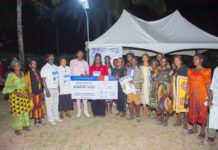The United Nations Children Fund (UNICEF) has said that Lagos State accounts for about 2,000 children with stunted growth as a result of malnutrition.
A nutrition specialist with the agency, Mrs. Ada Ezeogu, disclosed this at a media advocacy meeting held in Sangotedo, Lagos, at the weekend.
The programme was organised by the National Orientation Agency (NOA) in partnership with the Fund.
The nutritionist warned against allowing the number to increase further because stunting has dire consequences on the physical growth and cognitive development.
She said stunting and wasting are health conditions resulting from malnutrition.
“Stunting affects not just the physical growth but (also) the cognitive development. And once the effect of stunting has set in, it is irreversible.
“That means, when a child is stunted, you can’t change that. That child is compromised in terms of height, physical development and cognitive development.
“So, you will not get the best from that child and that child will not achieve the full potential in life,” she said.
The specialist said stunting has implications that go beyond childhood even unto adulthood, the reason she insisted, should be prevented as much as possible.
“Once there is malnutrition, the child easily falls ill and the immune system is also compromised. Consequently, health cost increases because the child is taken more often to the hospital and will be treated. This is the health cost implication.
“Also, that child may not be as good as one who is fully nourished in school and by implication, result in repetition of class. All these have economic impacts on the economy and on the school system.
Ezeogu also said the percentage of wasting in Lagos is higher than the global target of less than five per cent.
She disclosed that the state has 6.4 per cent which translate to about 200,000 children in numbers.
“Immediately a child is screened and found to be severely malnourished, the child should be referred to a health centre.
“Fortunately, Lagos is already doing something with the management of severe acute malnutrition (SAM).
“They are using the ready-to-use therapeutic food and if there are underlying conditions, they will be treated.
“We encourage mothers to take the children immediately to health facilities for attention because for wasting, if these children are not treated on time, we may lose them,” she added.
However, Ezeogu said there is no designated centre for SAM in the state but pointed out that the intervention programme could be found in some hospitals.
“I am aware that Mercy Children Hospital has a ward where they treat children with SAM and they were trained to handle such cases,” she said.
The specialist urged the government to increase screening in order to identify affected children in the communities as well as increase the number of health workers who have the skill to screen children.
“By so doing, there will be timely intervention and those children affected can be identified early enough and referred to a health care centre,” she added.
























































